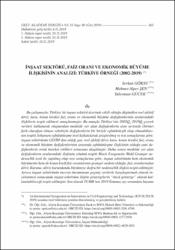| dc.contributor.author | Göksu,Serkan | |
| dc.contributor.author | Şen,Mehmet Alper | |
| dc.contributor.author | Gücek,Süleyman | |
| dc.date.accessioned | 2020-01-29T11:36:08Z | |
| dc.date.available | 2020-01-29T11:36:08Z | |
| dc.date.issued | 26.12.2019 | en_US |
| dc.identifier.citation | Göksu,S. Şen,M.A. Gücek,S. (2019). İnşaat sektörü, faiz orani ve ekonomik büyüme ilişkisinin analizi: Türkiye örneği (2002-2019). Ekev akademi dergisi. 23(80), 465-482. | en_US |
| dc.identifier.uri | http://www.ekevakademi.org/DergiTamDetay.aspx?ID=1278&Detay=Ozet | |
| dc.identifier.uri | https://hdl.handle.net/11630/8227 | |
| dc.description | Makale | en_US |
| dc.description.abstract | Bu çalışmayla; Türkiye’de inşaat sektörü üzerinde etkili olduğu düşünülen reel efektif döviz kuru, konut kredisi faiz oranı ve ekonomik büyüme değişkenlerinin aralarındaki ilişkilerin tespit edilmesi amaçlanmıştır. Bu amaçla Türkiye’nin 2002Q1 -2019Q2 çeyrek verileri kullanarak oluşturulan modelde yer alan değişkenlerin aynı seviyede (birinci fark) durağan olması sebebiyle değişkenlerin bir biriyle eşbütünleşik olup olmadıklarının tespiti Johansen eşbütünleşme testi kullanılarak araştırılmış ve test sonuçlarına göre; inşaat sektörünün GSYİH’dan aldığı pay reel efektif döviz kuru, konut kredisi faiz oranı ve ekonomik büyüme değişkenlerinin arasında eşbütünleşme ilişkisinin olduğu yani değişkenlerin ortak hareket ettikleri sonucuna ulaşılmıştır. Daha sonra modelde yer alan değişkenlerin aralarındaki ilişkinin yönünü tespiti Block Exogeneity Wald Granger nedensellik testi ile yapılmış olup test sonuçlarına göre; inşaat sektörünün hem ekonomik büyümenin hem de konut kredi faiz oranlarının granger nedeni olduğu; faiz oranlarından döviz Kuruna; döviz kurundanda büyümeye doğru bir nedensellik ilişkisi tespit edilmiştir. Ayrıca inşaat sektörünün mevcut durumunun geçmiş verilerle karşılaştırmalı olarak incelenmesi sonucunda inşaat sektörüne ilişkin göstergelerin “öncü gösterge” olarak kullanılabileceği tespit edilmiştir. Son olarak TCMB’nın 2019 Temmuz ayı sonundan buyana kademeli olarak aldığı politika faiz indirim (%24, %19.75, %14.00) kararlarının 2018 yılında daralma yaşayan inşaat sektörü üzerinde pozitif etkilerinin olduğu tespit edilmiştir. Sonuç olarak Türkiye’nin salt büyümeden ziyade; sürdürülebilir ve istikrarlı bir büyümeyi kendisine hedef alan bir pozisyonda geleceğini sağlam temellere dayandırabilmesi için tıpkı inşaat sektörüne verdiği önem gibi diğer sektörlere de önem vermesi gerektiği söylenebilir. Büyümede tek bir sektörü merkeze alan bir model ekonomik büyümenin geleceği için sıkıntı oluşturabilecektir. | en_US |
| dc.description.abstract | With this study; the construction sector in Turkey, which is thought to have an effect on the real effective exchange rate, interest rate of housing loan and economic growth are aimed to determined the relationships between variables. For this purpose Turkey the 2002Q1 -2019Q2 quarter model generated using data from the same level of the variables (first difference) of the variable due to the stable detection of whether they are cointegrated with each other was investigated using johansen cointegration test, and according to test results; it is concluded that the share of the construction sector in GDP is a cointegration relationship between real effective exchange rate, interest rate of housing loan and economic growth variables. Then the direction of the relationship between the variables in the model was determined by the block exogenetiy wald granger test. That the construction sector is the granger cause of both economic growth and housing loan interest rates; interest rates to exchange rates; a causality. Also, the examination of the construction sector's current status compared with historical data has been determined to be used as individual indicators. Finally, it has been determined that the policy rate cuts that the central bank of Turkey (24%, 19.75%, 14%) has gradually taken since the end of July 2019 has positive effects on the consruction sector which has contracted in 2018. Consequently only than growth Turkey; that the sustainable and stable growth should take importance to other sectors as important to the construction sector to be based on the strong foundations in a positive position a model that focuses on a single center of growth can create a problem for the future of economic growth. | en_US |
| dc.language.iso | tur | en_US |
| dc.publisher | Erzurum Kültür Eğitim Vakfı Yayınevi Adına Prof. Dr. Necati YILDIZ | en_US |
| dc.identifier.doi | 10.17753/Ekev1278 | en_US |
| dc.rights | info:eu-repo/semantics/openAccess | en_US |
| dc.subject | İnşaat | en_US |
| dc.subject | Büyüme | en_US |
| dc.subject | Faiz | en_US |
| dc.subject | Eşbütünleşme | en_US |
| dc.subject | Nedensellik | en_US |
| dc.title | İnşaat sektörü, faiz oranı ve ekonomik büyüme ilişkisinin analizi: Türkiye örneği (2002-2019) | en_US |
| dc.title.alternative | Analysis of the relationships among construction sector, interest rate and economic growth: The case of Turkey (2002-2019) | en_US |
| dc.type | article | en_US |
| dc.relation.journal | Ekev akademi dergisi | en_US |
| dc.department | Dazkırı Meslek Yüksekokulu | en_US |
| dc.authorid | 0000-0003-3261-6769 | en_US |
| dc.identifier.volume | 23 | en_US |
| dc.identifier.startpage | 465 | en_US |
| dc.identifier.endpage | 482 | en_US |
| dc.identifier.issue | 80 | en_US |
| dc.relation.publicationcategory | Makale - Uluslararası Hakemli Dergi - Kurum Öğretim Elemanı | en_US |
| dc.contributor.institutionauthor | Göksu, Serkan | |



















